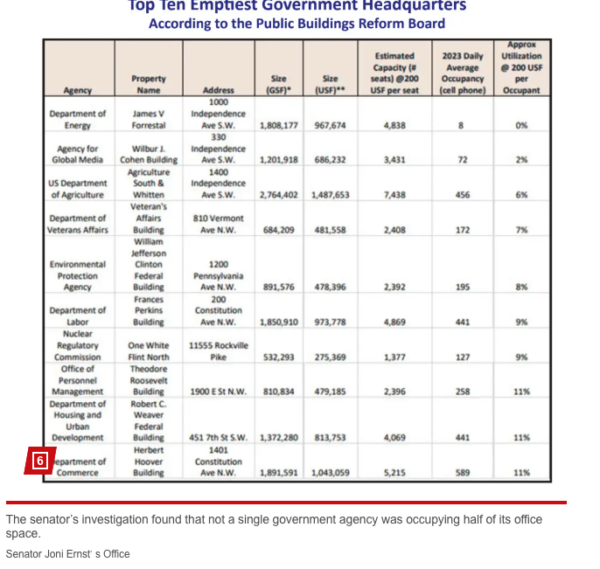No-Show Federal Employees are Now Being Remote-ly Professional: The Deep State’s Ghost Town (Word Count: 628; reading Time: ~3 minutes)
Senator Joni Ernst’s report paints a picture—no, a portrait—of inefficiency. Only 6% of federal employees work full-time in person. Nearly one-third are fully remote. And before the pandemic? A mere 3% teleworked daily. We’ve gone from desks to pajamas faster than you can say “Zoom meeting.”
But here’s the kicker: taxpayers are forking over $15.7 billion yearly for federal office buildings. These buildings are, on average, 12% occupied. That’s right, 12%. Meanwhile, the government owns 8,000 vacant buildings and over 2,200 that are barely used, costing another $15 million annually. That’s your money, paying for ghosts.
And who’s benefitting from this? The landlords. Thirty percent of federal office space in D.C. is leased, with 11.7 million square feet of contracts about to expire. Ask yourself—who are these landlords? Why is their payday protected while taxpayers foot the bill?
Now, let’s talk about remote work. Office workers spend $863 a month commuting, buying lunches, etc. Remote workers? About half that. It’s cheaper for employees, but taxpayers still cover the costs of empty offices. Imagine paying rent for a mansion you’ve never even set foot in because you’ve decided to live by the beach.
Federal employee unions are doubling down on remote work. Even President Biden’s call to “substantially increase meaningful in-person work” was met with a shrug. Elon Musk put it bluntly: less than 1% of federal employees work a full 40-hour week in person if you exclude maintenance and security staff. Less than 1%. Think about that.
Now, imagine a different story. A government where accountability is real. We close the unused offices, slash the waste, and reinvest in what matters. This isn’t about spreadsheets or balance sheets. It’s about respect—respect for the people who pay the bills.
We cannot afford NOT to let DOGE—the Department of Government Efficiency—do its job. The Democrats may dodge it, but the rest of us shouldn’t. Government unions and private landlords leasing buildings to the government need the curtains pulled back. These two groups aren’t just inefficiencies—they’re factions. Special interests with outsized influence. They meddle in governance while lawmakers play favorites. And guess who gets left behind? You, the citizen.
Leaders like Ernst, Musk, and Ramaswamy are calling for action. Not more talk. Not more bureaucracy. Action. It’s time to treat taxpayers like shareholders. Because the reality is simple: if federal employees can’t be found at their desks, where are they?
We need a government that works—not just sometimes, not just remotely, but always, and for the people who pay for it. It’s time to demand better. It’s time to think differently.
Sources:
“Federal Employees in Remote Work: A Study,” Senator Joni Ernst’s Office.
“Working from Office vs. Working Remote Costs,” money.com.
“Empty Federal Buildings Cost Billions,” gao.gov.
“Federal Office Leases in D.C.,” us.jll.com.
“Federal Employees and Remote Work,” reason.com.
